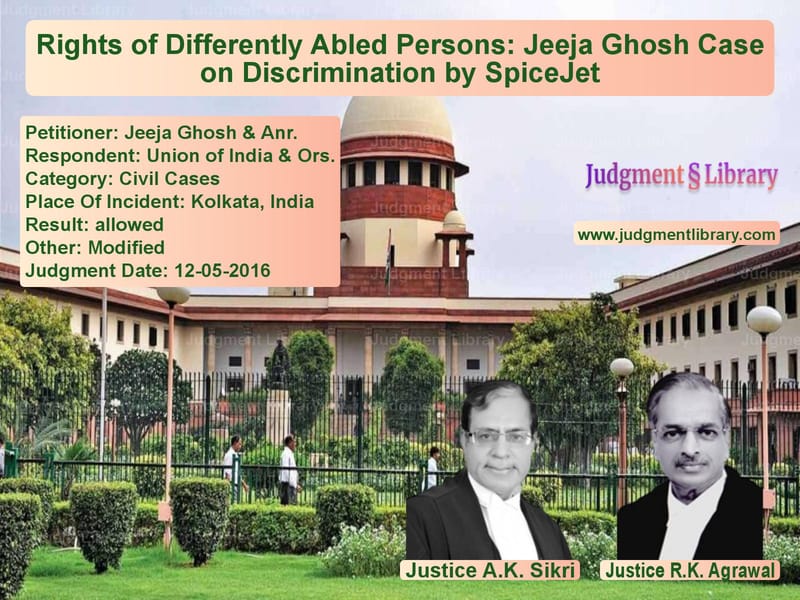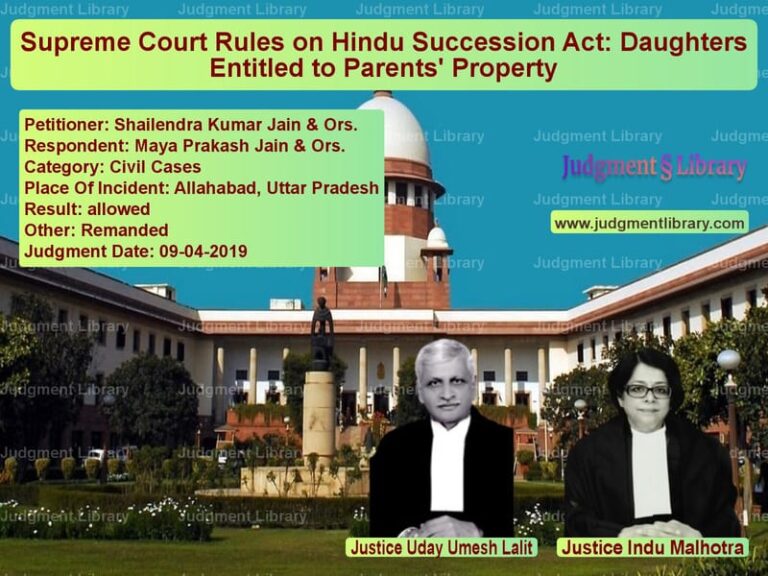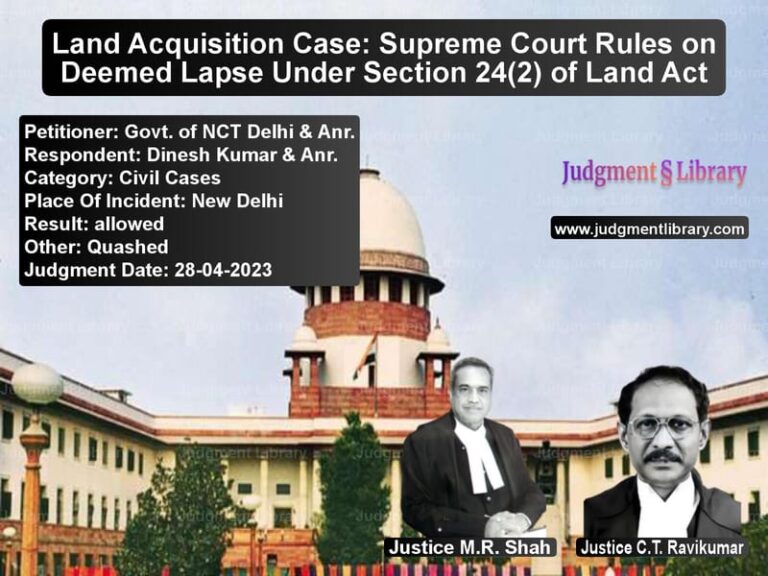Rights of Differently Abled Persons: Jeeja Ghosh Case on Discrimination by SpiceJet
The case of Jeeja Ghosh, a disabled individual with cerebral palsy, who was forcibly removed from a SpiceJet flight in February 2012, raised significant legal and human rights issues concerning discrimination against persons with disabilities in the aviation sector. Jeeja, an activist and well-regarded member of the disability rights community, was denied the opportunity to board a flight to Goa, which she had been invited to attend for a critical conference. The incident brought attention to the plight of differently-abled individuals and the pervasive discrimination they face, even within established laws meant to protect them. This case also highlighted the gaps in regulations governing the treatment of passengers with disabilities by private entities, including airlines.
Background of the Case
The issue arose when Jeeja Ghosh was invited to the North South Dialogue IV conference in Goa, organized by ADAPT. SpiceJet was responsible for her flight arrangements. Despite her informing the airline at check-in that she was disabled, she was removed from the flight at the insistence of the captain, citing safety concerns related to her disability. Jeeja was distressed by the incident, which caused her significant emotional trauma and led to her missing the conference altogether. She filed a writ petition seeking accountability and redressal for the harm caused.
The Incident
On February 19, 2012, Jeeja Ghosh boarded SpiceJet flight SG 803 from Kolkata to Goa. Despite following all necessary procedures, including informing the airline of her disability, she was approached by flight crew members and ordered to de-board. Despite her protests and explaining the importance of attending the conference, she was removed from the flight. SpiceJet’s staff claimed it was due to concerns over her health, though there was no medical intervention or interaction with her to assess her condition. The airline later claimed the decision was made based on safety protocols outlined in their regulations.
Petitioner’s Arguments
The petitioners, led by Jeeja Ghosh, argued that the actions of the airline violated her fundamental rights under the Constitution, particularly the right to life with dignity (Article 21) and the right to equality (Article 14). They highlighted that the airline’s refusal to allow her to board, despite her informing them of her disability, was an act of discrimination. The petitioners pointed to the ‘Civil Aviation Requirements’ (CAR 2008), which mandates airlines to assist passengers with disabilities and prohibited refusal of services solely due to a disability. Furthermore, the petitioners emphasized that the airline failed to adhere to these requirements, leading to an undue and humiliating experience for Jeeja.
Respondent’s Arguments
SpiceJet, in its defense, claimed that Jeeja Ghosh had failed to properly inform them about her disability at the time of booking or check-in, as required by CAR 2008. They argued that had she disclosed her condition, the airline would have made the necessary arrangements for an escort and assistance. They also cited the airline’s duty to ensure the safety of all passengers, claiming that Jeeja’s health condition, as perceived by the crew, posed a risk to her safety and the safety of other passengers. The airline contended that the decision to remove her was taken in good faith, based on the regulations set forth in the Aircraft Rules of 1937 and CAR 2008.
Legal Framework and Precedents
The petitioners referred to the Persons with Disabilities (Equal Opportunities, Protection of Rights and Full Participation) Act, 1995, which mandates that persons with disabilities be given equal access to public services and transportation. Additionally, they highlighted India’s ratification of the United Nations Convention on the Rights of Persons with Disabilities (UNCRPD), which obligates the country to ensure that disabled persons are treated equally in all public domains, including air travel. The petitioners further argued that the CAR 2008, issued by the Directorate General of Civil Aviation (DGCA), clearly outlines the obligations of airlines towards passengers with disabilities, including non-discrimination and the provision of necessary assistance during travel.
Supreme Court’s Judgment
The Supreme Court of India, in its judgment, noted the clear violation of the constitutional rights of Jeeja Ghosh, specifically her right to live with dignity and without discrimination. The Court recognized that the airline’s actions were not based on any substantial medical evidence or a proper assessment of her condition. The Court emphasized that the airline’s staff failed to engage with Jeeja, did not attempt to interact with her about her health, and did not seek any medical assistance before making the decision to de-board her.
The Court also pointed out the lack of proper adherence to the ‘Civil Aviation Requirements’ by SpiceJet, especially the provisions that ensure no passenger is denied boarding solely on the basis of their disability. The Court criticized the airline for its failure to follow established protocols and its inadequate response to the incident, which led to significant emotional distress for Jeeja Ghosh.
Moreover, the Court underscored the importance of human dignity in the context of disability rights, as enshrined in the Constitution. It cited international human rights frameworks, including the UNCRPD, to affirm that discrimination against persons with disabilities in any form, including in air travel, violates their basic human rights.
Relief and Compensation
The Supreme Court ordered SpiceJet to pay a sum of ₹10,00,000 as damages to Jeeja Ghosh for the mental trauma, humiliation, and suffering she endured due to the incident. The Court noted that the airline’s actions were not only discriminatory but also caused significant emotional harm to the petitioner. The judgment also called for greater sensitivity and proper training for airline staff to handle passengers with disabilities in a respectful and dignified manner.
Conclusion
This case stands as a landmark judgment on the rights of persons with disabilities, particularly in the context of air travel. The Supreme Court’s decision emphasizes the importance of treating differently-abled individuals with dignity, respect, and fairness. The case serves as a reminder to all service providers, including airlines, that they are bound by both national and international law to ensure the equal treatment of persons with disabilities. Furthermore, the Court’s ruling underscores the need for a societal change in attitudes towards persons with disabilities, emphasizing that their rights and dignity should never be compromised.
Don’t miss out on the full details! Download the complete judgment in PDF format below and gain valuable insights instantly!
Download Judgment: Jeeja Ghosh & Anr. vs Union of India & Ors Supreme Court of India Judgment Dated 12-05-2016-1741860821597.pdf
Direct Downlaod Judgment: Direct downlaod this Judgment
See all petitions in Consumer Rights
See all petitions in Damages and Compensation
See all petitions in Judgment by A.K. Sikri
See all petitions in Judgment by R K Agrawal
See all petitions in allowed
See all petitions in Modified
See all petitions in supreme court of India judgments May 2016
See all petitions in 2016 judgments
See all posts in Civil Cases Category
See all allowed petitions in Civil Cases Category
See all Dismissed petitions in Civil Cases Category
See all partially allowed petitions in Civil Cases Category







